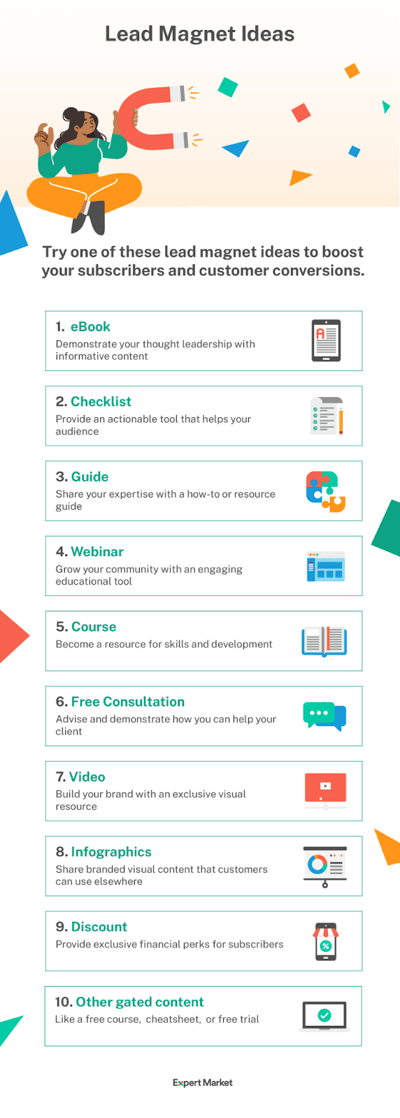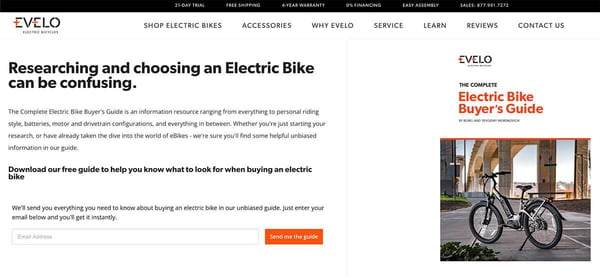
Email users form a massive demographic for any business.
There were over 3 billion of them in 2019, and the number has only grown since then.
That makes an email list one of the best assets you can have. A database of engaged prospects immunes you from ever-changing search engine and social media algorithms. And it allows you to turn those prospects into customers.
Not just that! If you run an e-commerce business, well-timed emails can also help reduce cart abandonment - currently over 70% for online purchases, and reclaim lost sales.
With that in mind, here are the best strategies you can start using right away to boost email signups and grow your email list.
Email marketing is still an essential component of any marketing plan. It’s not hard to see why. It’s effective, and it gives the highest marketing returns.
As per a 2020 Litmus survey, four out of five marketing professionals stated that if they had to choose between social media and email marketing, they would pick email marketing. The significance of email keeps increasing annually.
As per the same survey, the percentage of participants who feel email is significant to their business achievements increased from 71% in 2019 to 78% in 2020.
So, what makes email marketing the preferred channel for top digital marketing professionals?
A collection of active email subscribers is a company’s most valuable resource as it is a component of owned media. It’s unaffected by the abrupt modifications in Google and social media algorithms.
Email marketing gives you more room to build your company’s narrative. Plus, it has significantly greater penetration and lower cost than other forms of marketing and advertising. When done right, email marketing is non-intrusive.
When a prospect readily provides you with their email, that means you’re welcome to reach them through their mailbox. You’re not forcing promotions on their face.
Using consistent, tailored content, you can gently turn prospects into long-term buyers. Email marketing software can help streamline this process for you. Regardless of the size of your business, your email subscribers can be critical to the profitability of your marketing efforts.
Lastly, email marketing lets you measure the performance of your campaigns with concrete metrics. Key performance indicators (KPIs) such as click-through rate (CTR), conversion rate (CR), and open-to-click rate (CTOR) provide helpful data to assess what you’re doing correctly and what requires refinement.
Here are 8 best practices to build an email list of engaged subscribers for your business.
Offering your visitors an appealing reward to subscribe is among the simplest techniques to increase email signups. This reward, also known as a lead magnet, is a gated resource. That means it’s available only to people who sign up and join your email list.
You may have already seen lead magnets on e-commerce websites. These include:
This strategy can do wonders for a variety of companies and marketing initiatives. A lead magnet could be a white paper, a video clip, a worksheet, or the results of an industry survey. Here’s an infographic that walks you through some popular lead magnet ideas.

Source: Expert Market
The important thing here is to develop a valuable resource that aligns with your website's content. For instance, Evelo, a producer of electric bikes, offers their visitors a buyer’s manual to grow their email list.

Source: Evelo
By providing all the relevant details that a potential buyer might need, this lead magnet helps the company earn visitors’ trust and build their email list.
While buying anything, people experience a greater sense of security when they get some kind of confirmation of the purchase. This could be via email or text message. Plus, they feel at ease when there’s a way to stay updated on their order.
That’s why most buyers now anticipate that their personal data will be collected at the checkout stage. So giving them a choice to subscribe to your email list in this “onboarding” phase is a win-win for both parties.
Depending on your e-commerce website builder, you may already have the setting to implement this option on your checkout page. Or you may have an app or plugin to achieve the same result. But the onboarding shouldn’t end there.
No one enjoys being treated as a random customer ID. If you don’t cultivate your prospects, the work you put in to acquire them will go to waste.
After you receive visitors’ emails, you should take steps to keep them engaged. And one such step is a welcome email series. According to an Omnisend report, the top three automated emails with the biggest conversion rates are welcome emails (51.9%), cart recovery (33.9%), and lapsed-purchaser messages (21.3%).
A welcome email sequence goes a long way to familiarize new subscribers with your company. It shows subscribers that they have signed up for a warm and vibrant community. The result is increased brand loyalty and commitment.
The key to getting more email subscribers is to offer valuable material that prospects want to sign up for. Focus on producing high-value email material your audience will love, and you won’t have to force them to join. They will want to sign up on their own.
When your content is fun, insightful, and beneficial, prospects will eagerly await your emails and willingly share them with their connections. This increases your visibility and leads to more subscriptions.
Your email topics should constantly try to respond to your prospects' most critical queries. And address their preferences and issues in a straightforward and complete manner. Here’s an example from BuzzSumo.
Source: BuzzSumo
There are many ways to identify such topics for your business. You engage with your buyers daily at conferences, trade shows, or on your e-commerce website. Look out for the questions and problems that you can address with your email content.
You can also talk to your customer-facing employees and note down issues they are familiar with. Then use the insights you get to come up with new content ideas that will connect with your audience.
Doing this demonstrates your understanding of your prospects and your willingness to assist them in making the best-educated purchase. They will consider you an expert and reliable mentor rather than a company looking to make a profit.
Campaigns that provide exclusive benefits only to a few select members can have multiple benefits. They help grow your email list, spread the word, and even trigger repeat purchases, resulting in a better customer lifecycle and high customer lifetime value (CLV).
For instance, Anthropologie has a straightforward email registration form. The title and the subtitle clearly state the reason you ought to sign up. Subscribers get early access to new arrivals and exclusive deals.
Source: Anthropologie
To get started, all you need to do is lock a few of your best pieces of content, deals, or other resources behind an email registration wall. You can use your e-commerce platform to create a VIP section unavailable to the general public.
A members-only area engages prospects in a deeper way than simply sharing all your content publicly on social media or your website.
Moreover, it demonstrates expertise in your niche since you’re offering original and in-depth content that’s not available anywhere else.
Providing the most appropriate content at the right time can take your email list growth to the next level. But you’ll first need enough understanding of your target audience to customize emails with relevant deals and content.
One way to gain this insight is to request feedback from people who visit your website.
The beauty of this tactic is that you can build your email list at the same time.
Create a form asking users to provide feedback about your business. And while doing so, add an option to follow up on the responses via email. Here’s an example from Usersnap.
Source: Usersnap
Another clever way to get feedback and know your audience better is to ask them a question in your welcome email, such as:
Getting this data from existing subscribers can help you implement strategies that help in acquiring new ones. This is because you’ll have a thorough understanding of their needs and preferences.
The majority of tactics in this article focus on maximizing conversions and attracting new members to your email list. But it’s also important to engage and keep your existing subscribers.
It’s no secret that many email lists are filled with outdated, invalid, and bogus email accounts. While having these emails may seem harmless, they can seriously hamper your email’s deliverability to active subscribers.
So make sure to regularly clean and renew your email list with an opt-in program. You can write a compelling sign-up email and shoot it to all the members of your list. Here’s an example:
Source: HubSpot
The cleaner your email list, the more genuine people will get your emails. And they’ll be better positioned to share those emails with their friends and colleagues, leading to further growth in email signups.
While numerous reports claim that the signup form fields should be kept to a minimum, the decision about “how many” is not that straightforward.
For example, HubSpot noticed that conversion rates declined as the form fields grew in number. But the reduction was not as huge as you might anticipate.
A form with ten fields, for example, performed only slightly worse than a form with one form field. In contrast, Unbounce found that shortening the form actually decreased email registrations.
So what should you do?
Ultimately, what matters most is the amount of data you require from your prospects. Usually, just getting a visitor’s name and email address is sufficient. Keeping two form fields eliminates resistance and ensures that registering is simple.
But there may be times when you require more than two form fields. In such situations, consider these factors:
If you’re looking for the most engaging way to grow your email list, consider making a quiz. Content that requires participation, like a quiz or poll, has a high conversion rate.
For instance, to give an entertaining twist to their facility, Children’s Hospital Los Angeles made a quiz on their site that connects individuals with therapy dogs depending on their personal traits.
Source: Children’s Hospital Los Angeles
The quiz contains many amusing questions like where you would want to play fetch, which shoes you wear when going on a stroll, how you picture your dream house to be, and much else to pair you with a most suited furry friend.
How does that help them build their email list? They send quiz results via email, gaining the ability to contact each participant regarding the latest news about their facility and other information.
So, how can you create a quiz? If your team has experienced design and development specialists, you can build your quiz from the ground up. However, if you are a small business, many online solutions offer fully prepared quiz templates.
We admit. You have so much to do. Investing time and effort into growing your email list may often seem like a drag. But we assure you that the ultimate payoff is huge. Building an email list is among the best marketing activities you can engage in.
The more signups you get on your email list, the more empowered you’ll be to generate leads and customers fast. You’ll have warmed-up prospects ready to spend money when you launch a new product, service, or campaign.
The result? An almost magical ability to generate predictable revenue for years to come. So start using these actionable strategies today. Good luck!
Unlock your email marketing potential with these eight handpicked templates.
Hitesh Sahni is a marketing consultant, copywriter, and founder of Smemark, an award-winning digital marketing agency that helps brands with superior content marketing, SEO, and PPC advertising services, tools, and insights to boost traffic and lead generation online.
In 2019, on average, 99 percent of consumers check their personal emails at least once every...
 by Victoria Taylor
by Victoria Taylor
Welcome emails are a form of art.
 by Ayal Menaged
by Ayal Menaged
Are you getting maximum utility out of your email marketing efforts?
 by Jonathan Herrick
by Jonathan Herrick
In 2019, on average, 99 percent of consumers check their personal emails at least once every...
 by Victoria Taylor
by Victoria Taylor
Welcome emails are a form of art.
 by Ayal Menaged
by Ayal Menaged


